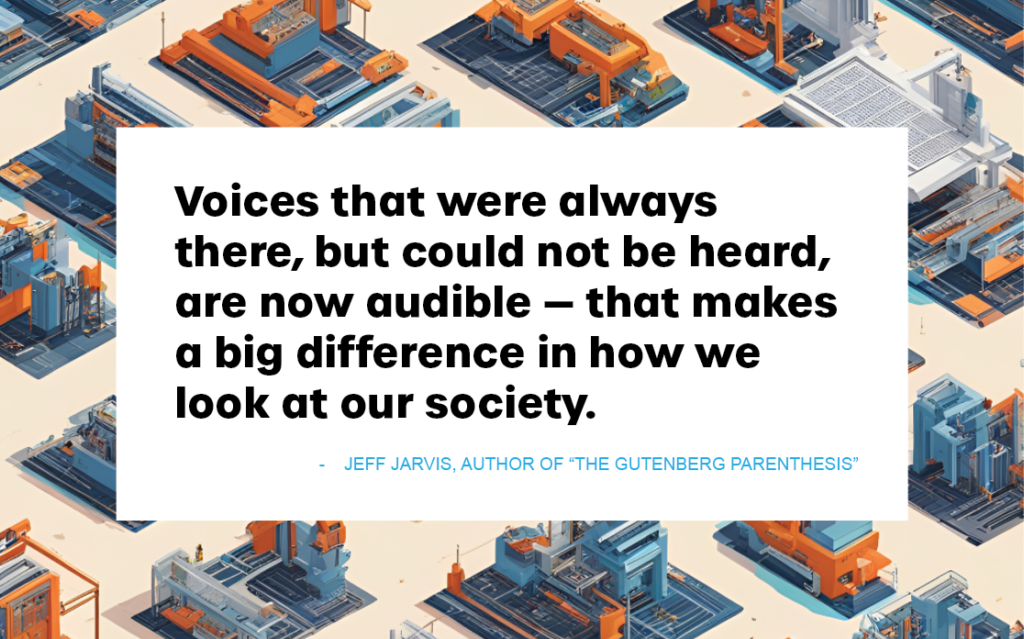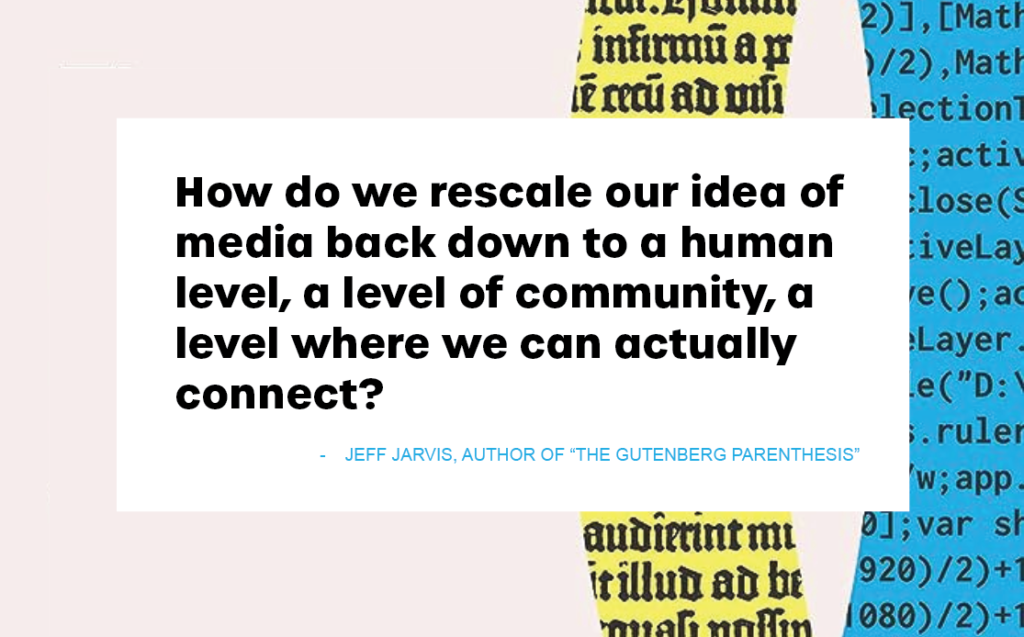When you read about Generative artificial intelligence and its capability to produce text, images, video and code, it’s typically framed as a disruptive technology that will replace creative jobs: NBC recently ran an article titled “Actors vs. AI,” and quotes SAG-AFTRA president Fran Drescher saying “if we don’t stand tall now… we are all going to be in jeopardy of being replaced by machines.” The message is simple: should we protect jobs, or should we embrace this new technology?
But what if NBC’s framing is wrong? What if, rather than replacing creative work, Generative AI empowers creators with new tools, destabilizes the gatekeeping and centralized power structures that control media, and ultimately reshapes the role media plays in our lives?
It’s a theory author and philosopher Jeff Jarvis explores in his latest book: “The Gutenberg Parenthesis.” He frames the invention of the printing press as an era of great exception in the history of human society: historically, humans passed on knowledge and shared art through personal interactions, but the printing press began an era of centralized mass media — and a major shift in the way we perceive our surroundings.
“Our cognition of the world changed through print,” Jarvis said in a recent discussion with The Human Effect, a collaborative workgroup Weber Shandwick Futures leads alongside The McLuhan Institute. “In print, things have a beginning and an end, an Alpha and an Omega. They weren’t in motion and flowing, they were contained. It changed how we cognized the world.”

Flash forward a few centuries, and this “permanent story technology” reaches a kind of zenith with the rise of Hollywood, international “blockbuster” film releases, and the internet. Suddenly people all around the world are enjoying the same media and stories at the same time: the omnipresence of something like “Star Wars” or Wikipedia creates a shared context for communication globally. This impact can be seen in how regular communication is now frequently informed by media references: One might casually quote Darth Vader or reference The Beatles and be understood by almost any audience, in almost any context. At this apex, a small number of studio, record and publishing executives are controlling the context of conversations across the planet. And it all started with the printing press, because as Jarvis said, “the story of print is the story of power.”
But with generative AI, we’re seeing those unique conversations come back, and at a massive scale. Look at Google Labs’ latest “Converse” update, which turns any Google search into a conversation. Trying to find an answer to a simple question — the example they use is “why do dogs love tennis balls” — brings you not to an explanation written for as broad an audience as possible, but an answer customized just for you, based on how you asked and, potentially, data about you: where you live and anything you’ve searched for before.
While we may, appropriately enough, be viewing this technology’s potential through the apocalyptic lenses of “The Matrix” or “The Terminator,” the actual conflict makes it clear that creators will be just as essential as ever: WGA and SAG-AFTRA demands are, among other things, about likenesses being re-used without compensation and writers’ work being used to fuel generative AI’s capabilities — and since they’re getting significant pushback, it would seem that these machines are still mostly useless without human creativity driving them.
In fact, advanced technology has rarely lessened the load on artists during production: In the worlds of video games and digital animation, artistic industries most closely integrated with cutting-edge technology, the danger seems to be more of artist burnout from high demand than those artists losing their relevance.

In the future, the difference may come down to personalization. If we eventually replace press releases with a system where a well-informed conversational AI explains nitty-gritty details to anyone curious enough to ask, we’ll still need someone to explain the parameters of what language can be used — a task that arguably requires more of a mastery of language than the writing and editorial work it replaces.
“Content fills things. It’s a passive word, like ‘audience,’” Jarvis said. “On this side of the parenthesis, society is re-learning how to have a conversation. What I think we see are voices that were always there, but could not be heard, are now audible, and I think that makes a big difference in how we look at our society.”
Throughout “The Gutenberg Parenthesis,” Jarvis finds different ways to point out that technology is never successfully repressed, and attempting to do so usually backfires — for institutions of all kinds. As we shift from centralized media to technology that can emulate interpersonal interactions, the creativity of individual people may actually become more valuable. In a way, it already has: “We think that Twitter is a huge mass,” Jarvis said, “but no two people see the same Twitter. You’re actually speaking to a very small number of people.”
Whether you’re telling a story, writing a press release, or giving a performance, the medium dictates how you deliver that message. Announcing news on a billboard is fundamentally different than announcing it online, telling a story on a stage in a small theater is different than telling it on a streaming service. But the root skills required — the innate understanding of people, married to an urge to connect with them, and the knack for sharp prose, design or melodies that can only born from that union — are the same. Less required are the centralized decision makers, orchestrators of mass media… e.g., the Hollywood studios.
AI will definitely be a tool that changes how we create — but it might also be a tool that changes how we consume. And whoever figures out the specifics of that first is going to have a huge advantage.
The big question, as Jarvis puts it, might be this: “How do we rescale our idea of media back down to a human level, a level of community, a level where we can actually connect?”
Joshua Sargent


